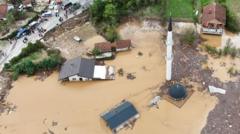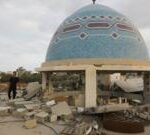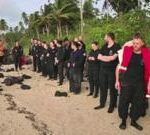Watch: Aerial footage shows flood and landslide destruction
Guy Delauney
BBC Balkans correspondent
Flash floods and landslides in central Bosnia-Herzegovina have left at least 18 people dead, with towns and villages cut off and reports in some places of homes being almost submerged.
Some of the worst scenes were in the area around Jablanica, a town on the main route between the cities of Mostar and the capital, Sarajevo, about 70km (40 miles) to the north-east.
A number of other people have been reported missing and a state of emergency has been declared.
Development minister Vojin Mijatovic said the country had witnessed a terrible disaster and appealed for calm.
Image source, Reuters
The area worst hit by flash floods and landslides was around Jablanica
Search and rescue work continues as more than a dozen people remain unaccounted for.
On Sunday, two more bodies were found in the village of Donja Jablanica.
Heavy rain apparently triggered a landslide from a quarry above the village that buried houses, with water levels rising to the roofline of some buildings.
Rescuers were clearing the mud from inundated houses by hand. Teams from Serbia, Croatia and North Macedonia had arrived to support, and EU countries were also sending help.
On Saturday, officials from the Herzegovina-Neretva Canton said 13 deaths had been confirmed in the area, rather than 16 as earlier reported.
In the town of Fojnica, three other deaths were confirmed.
Rivers burst their banks after an overnight storm and aerial photos showed many towns and villages left inundated.
Roads, bridges and railway tracks were washed away or blocked by debris, while landslides left houses buried in rocks and earth as high as their upper storeys.
Some of the worst scenes of flooding with in Jablanica and nearby villages
The main M-17 route, which runs alongside the River Neretva was covered in debris close to Jablanica and a 17km-stretch of railway was badly damaged between nearby Ostrozac and Grabovica to the west. One 200m stretch of track was left hanging in the air by a landslide close to the river south of Jablanica.
The local authority in Herzegovina-Neretva Canton warned drivers to avoid dangerous roads around Jablanica.
Further east along the Neretva river, one homeowner told Bosnian media that water had flooded house at 03:30 on Friday and that they barely managed to save their son before escaping to neighbours and seeing their house collapse.
Meanwhile, 20km to the west of the capital around around Kiseljak, a torrent of water flooded the streets, leaving cars submerged.
The flooding was not confined to Bosnia. In neighbouring Montenegro, roads were washed away leaving the village of Komarnica cut off.
Water levels were also rising in some of Croatia’s rivers, and the government in Zagreb said there was a risk of some areas in the city of Karlovac being flooded close to the Kupa river.
Much of Central Europe was hit by floods last month, with some of the worst devastation in Poland, the Czech Republic and Romania.
Scientists from the World Weather Attribution (WWA) group said one four-day period had been the rainiest ever recorded in the region. They said the floods had been made much worse by climate change.
Europe is the fastest-warming continent. The last five years were on average around 2.3C warmer than the second half of the 19th Century, according to the Copernicus climate service.
















